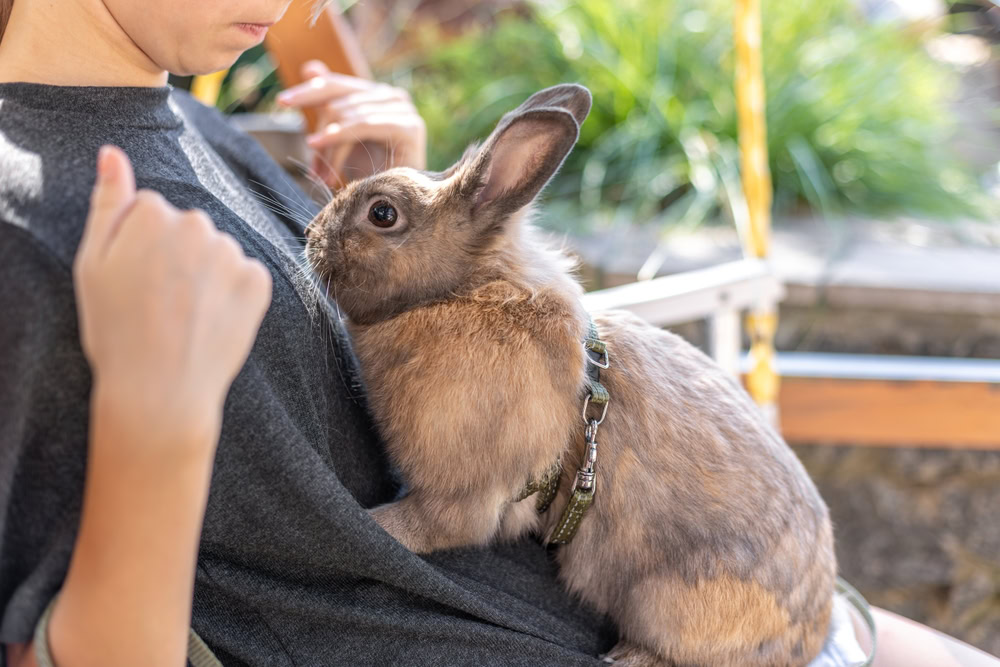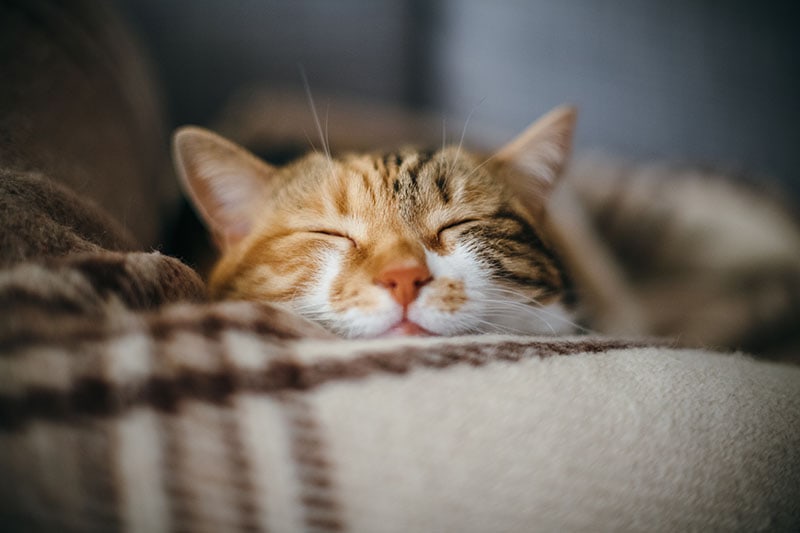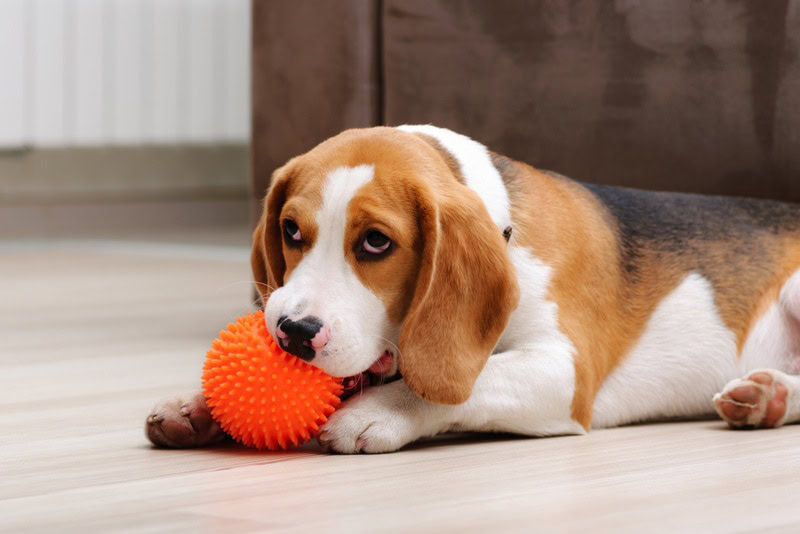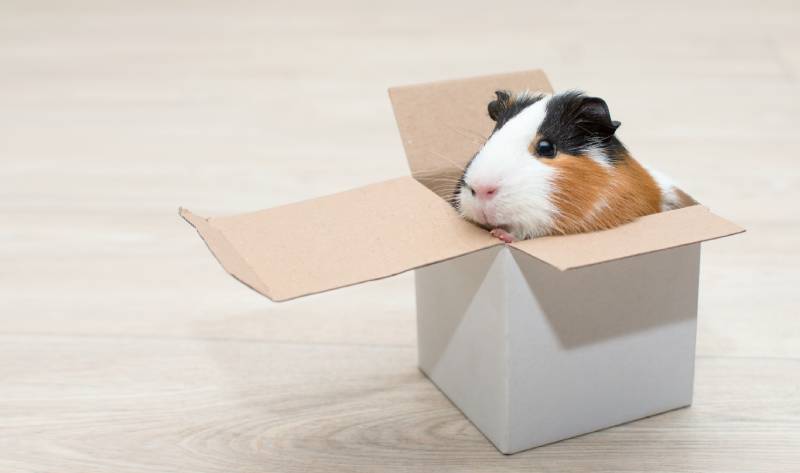VET APPROVED

The information is current and up-to-date in accordance with the latest veterinarian research.
Learn more »Click to Skip Ahead
Rabbits can be wonderful pets. With their soft, downy fur, velvety ears, and cautiously inquisitive nature, it can be easy to forget that behind those innocent-looking eyes there often lies a mischievous bunny. Many people don’t realize that rabbits are more than just meek, cuddly, nose-twitching animals; when they feel secure and comfortable in their home, they can be chaotic, energetic, and even destructive.
One complaint that many bunny owners have is about their pet’s propensity for biting and chewing things – walls, curtains, the buttons from the TV remote control – and you might be wondering why rabbits like to bite your clothes.
Fear not, your rabbit is not passing judgment of your fashion sense, nor are they deliberately trying to upset you. Much of the time, rabbits bite items like clothing, furniture, and other non-food items, for completely normal and natural reasons, but it can also be a sign that something is wrong.
Let’s look at some common reasons that rabbits bite clothes, and how you can try to curb the habit.

Rabbits Are Like Horses
In veterinary medicine, we often joke that rabbits are just like tiny horses, which might seem quite surprising given their appearance! However, despite their vastly different physical features, they have many things in common. For example, rabbits and horses:
- are curious but easily spooked.
- are quite robust in health, but succumb quickly to illness.
- are hindgut fermenters (the majority of their digestion takes place in the intestines, where tough, fibrous material is broken down with the help of microbes).
- need to be eating and pooping throughout the day.
- are unable to vomit.
- like to explore things with their mouths.
- have hypsodont teeth – the crowns are very long, allowing the teeth to continuously emerge from the gum as they are worn down.1
- are very susceptible to complications from dental disease, particularly if given inappropriate foods.
- will chew, bite, and nibble at objects for normal and pathological reasons.
Why are we comparing rabbits and horses? Firstly, because it’s really interesting! But secondly, it can help you get a better understanding of why rabbits do things like bite your clothes, and what you can do to prevent it.

8 Reasons Why Rabbits Bite Your Clothes
1. They’re Curious
Despite the fact that rabbits often seem very nervous and skittish, they are actually quite inquisitive creatures, and once they have established that something or someone isn’t a threat, the first thing they’ll want to do is investigate. This usually starts with “Can I eat it?”
If the item in question isn’t edible, the next question is “Is it fun to play with or chew?”
2. They’re Hungry
Rabbits need to have food available throughout the day. Fresh vegetables and greens should be limited to set meals as we don’t want them spoiling, but there should always be some commercial pellets for them to snack on during the day. This keeps their digestive system happy and healthy and stops those very important gut microbes from kicking up a fuss. Be sure to choose a high-quality pellets that isn’t too high in fat.
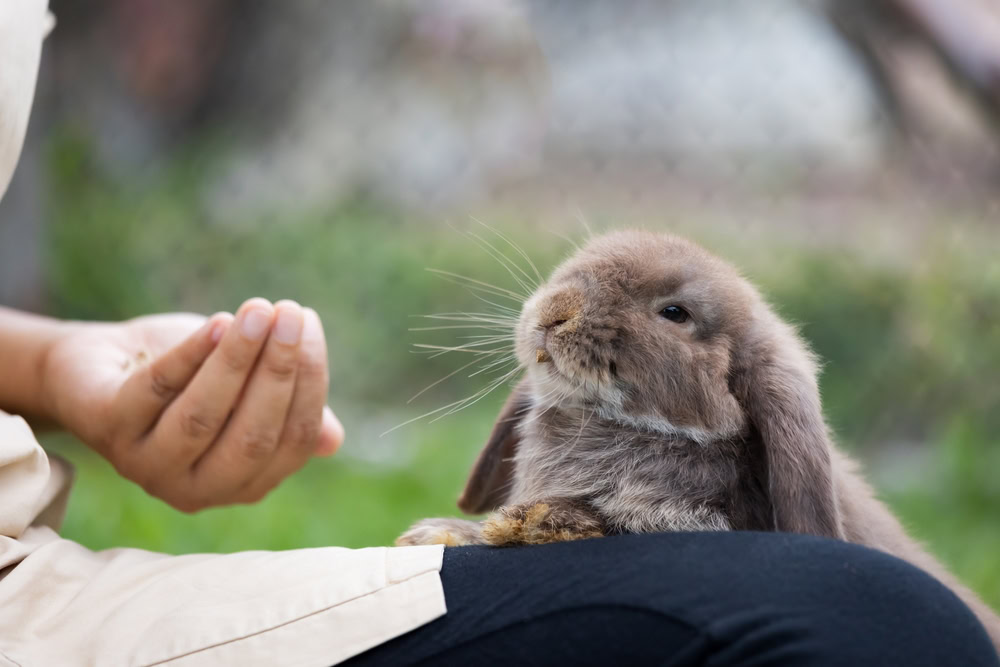
3. They’re Wearing Their Teeth Down
Because your rabbit’s incisors and cheek teeth are constantly erupting, a feature that is essential for animals that are fed a diet of tough, fibrous material, those teeth need to be worn down. A wild rabbit’s diet consists almost exclusively of plants, this isn’t usually a problem. Pet rabbits, however, are often not given enough of the fibrous plant matter, like hay, to keep those teeth worn down naturally, so they will look for other items to do the job.
Equine dentists are often called out to file down horse teeth with a large, electric file to prevent the teeth from overgrowing, and even rabbits will occasionally need to have their teeth filed or trimmed.
4. They’re Bored
Horses usually get to run around in fields or paddocks, chasing their friends, or going for rides, but life in the stable can be very dull by comparison. For many pet rabbits, the same situation applies, but they often spend more time in their hutch than out exploring the world. This is usually for their own safety, but it does mean that they can be more susceptible to becoming bored and frustrated. This can cause them to act out, using destruction as a method for venting their frustrations.
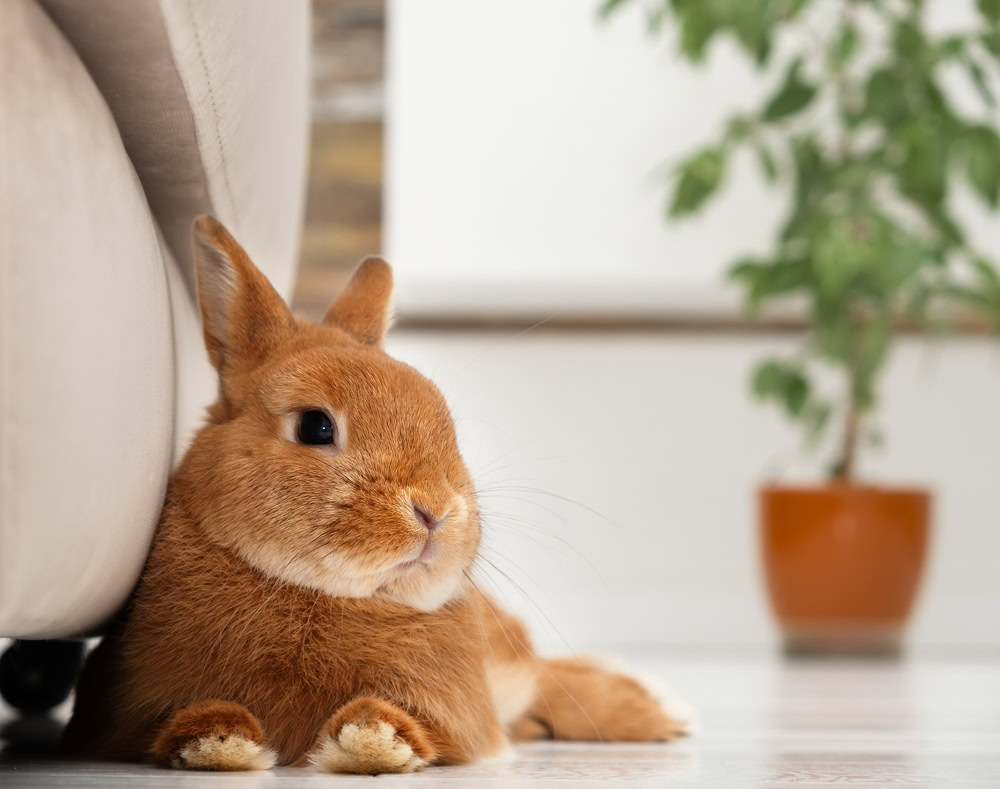
5. They Have Dental Disease
Like all animals with teeth, dental health is essential to overall health, but with species like rabbits, this is particularly true. Uneven wear of the teeth can result in sharp edges that cut the gums, overgrown incisors can prevent them from getting food into their mouth, and dental abscesses can be a death sentence. Chewing objects, dropping food from their mouths, salivating, or weight loss can all point to a dental problem, which is something that cannot be ignored.
6. They Have Digestive Problems
The microbes that allow rabbits to digest foods that many other creatures can’t, can cause major problems if they’re not treated right. Things like inappropriate foodstuffs, poor nutrition, antibiotics, or inappetence can upset the balance of helpful and harmful bacteria in the gut, which can lead to bloating, pain, ileus (gut stasis), and constipation. Chewing can be a rabbit’s way of dealing with this discomfort.
You may have heard the phrase:
If you don’t eat, you don’t poop, and if you don’t poop, you die.
Well, this is doubly important for a rabbit, because these consequences can happen over a matter of hours, not days. If you haven’t seen any fresh rabbit poops for more than 24 hours, you need to get them to a vet right away.
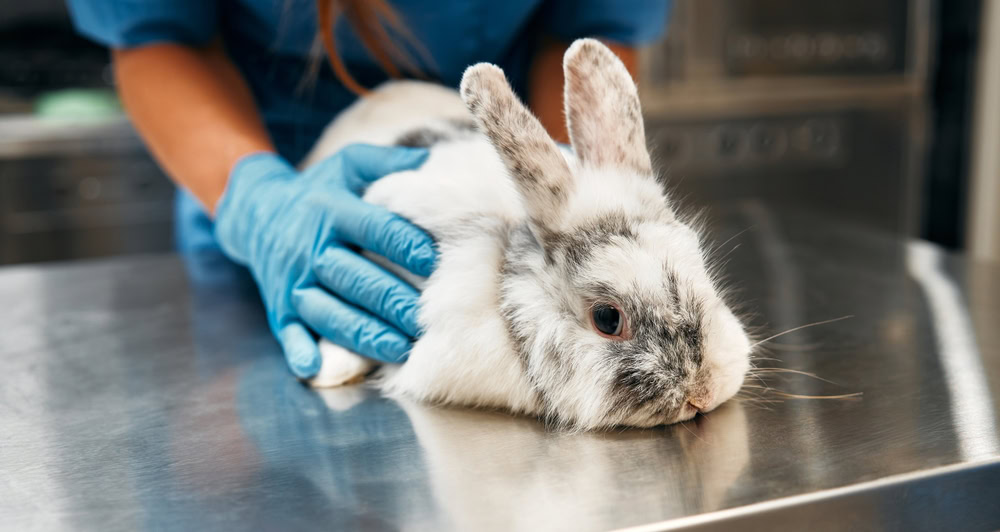
7. They Are In Pain
It can be really hard to tell if a rabbit is experiencing pain. As a prey species, they are masters at masking pain and illness, which is why we often don’t find out about a problem until it’s too late. This makes it really important to be attuned to your pet’s normal behaviors so that you can pick up and act on anything out of the ordinary.
Animals like rabbits or horses will often grind their teeth (called bruxism) if they are in pain, and this can sometimes extend to chewing or biting things like our clothes. Rabbits may also engage in bruxism when they are angry.
8. They Are Babies
Baby rabbits (also known as kits or kittens) are usually weaned when they are 4-6 weeks old. If you have brought home a young kit (less than 6-7 weeks old) they may not have been quite ready to leave their mother or were just reluctant to do so. Some young animals will suck, nibble, or bite fingers, blankets, and clothing as a substitute for suckling their mother. This behavior will usually settle as the bunny grows, but some rabbits will be more persistent, and you may need to take action.
QUICK QUIZ
QUESTION: What is the word for a rabbit giving birth? (keep reading for the answer) |

How To Stop Your Rabbit Biting Your Clothes
1. Regular health checks
Perhaps an obvious one, but also the most important. Rabbits don’t always get the same amount of veterinary care and attention as cats and dogs, but this isn’t because they don’t need it. At the very least, your pet rabbit should be seen for an annual health check and vaccination. Deadly viruses such as Rabbit Hemorrhagic Virus (RHV) and Myxomatosis (mostly outside the US) are preventable by vaccinating your pet, and an annual booster appointment is the perfect time for a full checkup.
Your vet can look, feel, and listen for any early signs of illness or disease, perform a dental check, and keep track of your bunny’s weight.
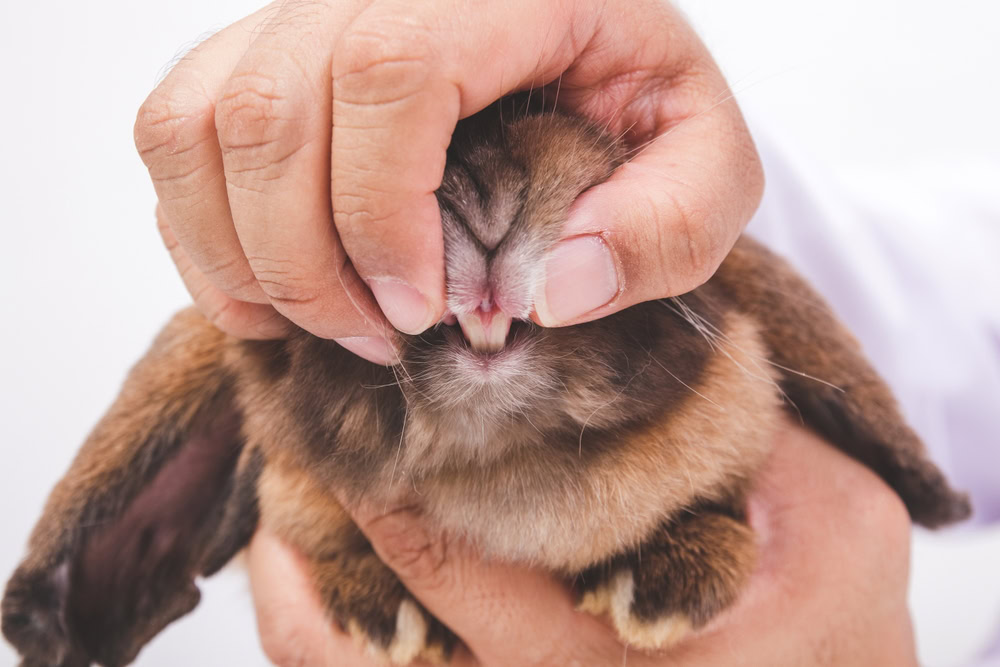
2. Provide rabbit-safe objects for chewing
We know that chewing is a normal, healthy part of your rabbit’s daily routine, so the best way to stop them from biting the things you don’t want them to bite (like your clothes), is by providing them with items you do want them to bite! Scolding or punishing your rabbit for damaging your clothes or belongings is only going to result in a frustrated, scared, or stressed bunny, so we need to find a way to reward them for chewing the right things.
Positive reinforcement may not seem as straightforward as giving praise and treats to a dog for sitting on cue, but there are certainly ways to use this method. Use interesting, interactive chew toys to hold their interest and fuel their curiosity, or items you can hide treats like fruit inside.
Don’t give your rabbit cloth items for them to chew, as they may ingest the material which can cause an intestinal blockage, and they won’t be able to tell the difference between the cloth they’re allowed to chew, and the cloth they aren’t.
3. Provide an appropriate, nutritionally balanced diet
A handful of hay and a bowl of pellets do not equal a good rabbit. Although these two items form the basis for a healthy bunny diet, it is also just the basics. Your rabbit needs to eat a variety of food items, not just to obtain nutrients, but to experience the same type of variation they would get through eating a wild diet, and provide them with different surfaces for chewing, and flavors to enjoy.
If you are giving your rabbit the boring basics day in and day out, you can’t blame them for seeking out a different ‘mouth feel’, so make sure you familiarize yourself with the dos, don’ts, how much, and how often, of proper rabbit nutrition.
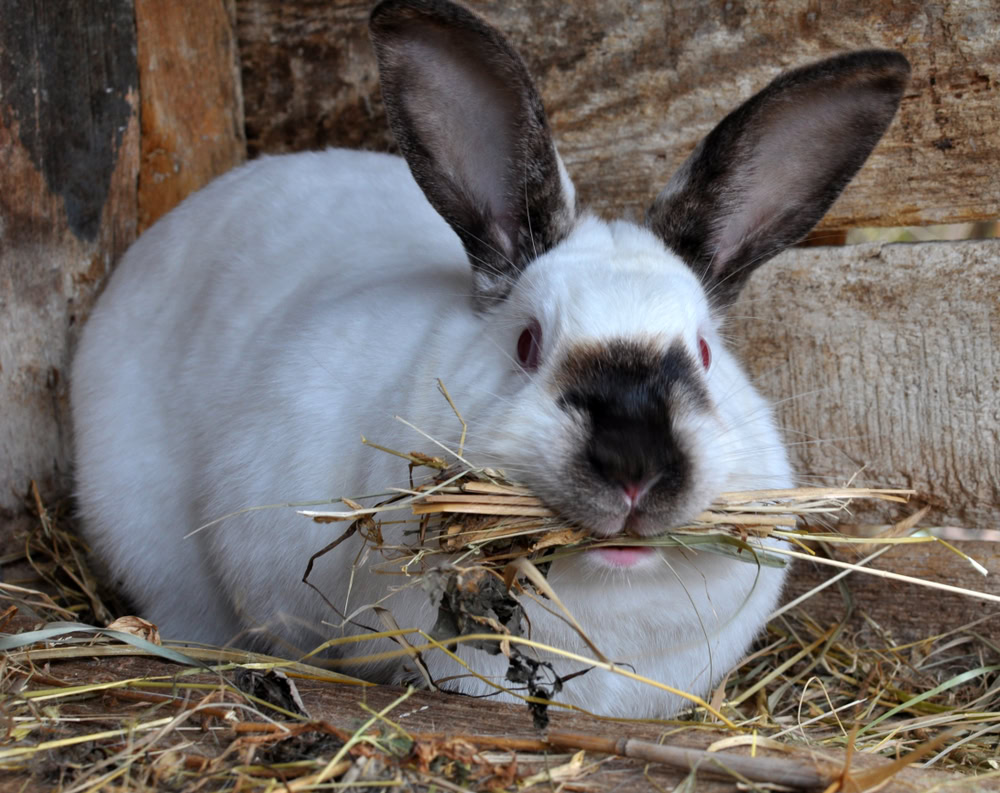
4. Spend time playing with your bunny
Pet rabbits that are left to spend most of their time in a cage or hutch will become less trusting of humans, frustrated and bored, and will be more inclined to run, hide, and chew things when they get a taste of freedom. Although wild rabbits don’t have enormous territories, they still have the freedom to hop, dig, and explore, and when we keep them as pets, that freedom is very much restricted.
If you have your heart set on keeping a rabbit as a pet, make sure you are prepared to spend plenty of time with them every day, providing them with physical and mental stimulation. This will improve your bond, and enrich both of your lives immensely.
5. Rabbit-proof your house
Before you allow your rabbit to explore your home, you need to do some rabbit-proofing, bearing in mind that rabbits can jump onto chairs and beds that you might think are too tall for them. Keep doors closed to rooms you don’t want them accessing, and keep any valuable items locked away and out of reach. You’d be surprised what objects rabbits will decide to sink their teeth into!
This is also important for foods, chemicals, or equipment that could be harmful or dangerous. Curious rabbits are more than capable of opening kitchen cabinets, so either use baby-proofing door catches or make sure there is nothing they can reach that could potentially cause them harm.
Rabbits love chewing power cords, so wind up any that aren’t in use, and get a powerful pet-proofing cover for the rest.
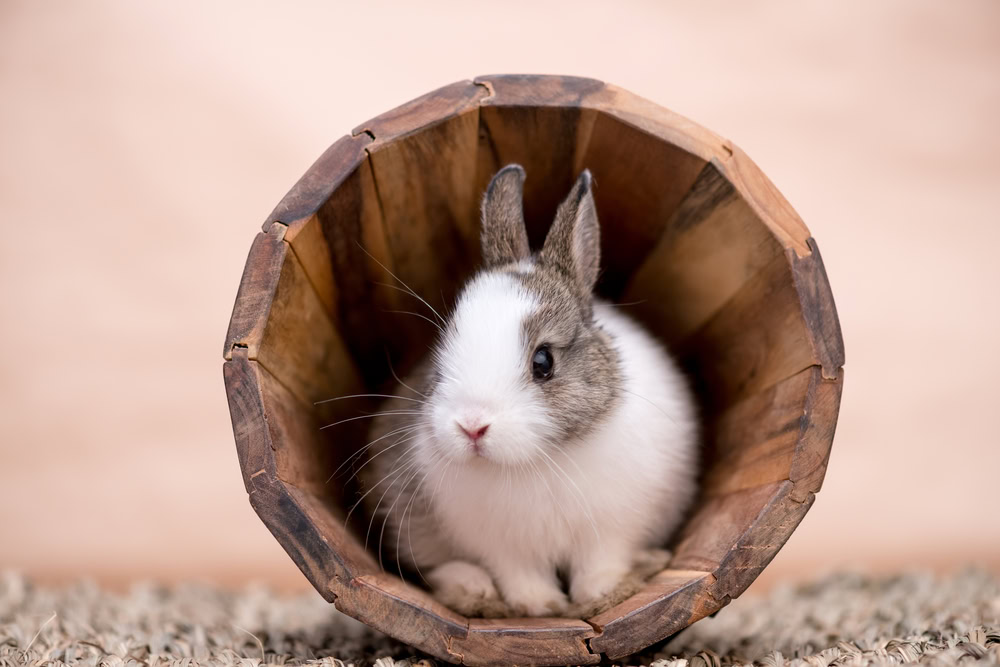
6. Keep Rabbits in Pairs or Groups
Rabbits are social animals and prefer to have company. In the wild, a solo rabbit is a vulnerable one, so sharing their home with one or a few friendly faces will go a long way to making them feel safe and secure, and alleviate boredom when you’re not around to play. You can keep any combination of male and female rabbits together, with two very important considerations:
- In mixed-sex groups, at least one of the sexes needs to be spayed/neutered, but preferably all individuals, as this has health benefits and reduces competition and fighting.
- If the rabbits are not littermates or have not lived together previously, you will need to take time to bond them, which can take around 2 months.
7. Find responsible breeders or rescue a rabbit
Rabbits shouldn’t be sold before the age of 10-12 weeks, so make sure you do your homework before handing over money to someone selling kits that are too young to go to new homes. Even better, get in touch with a local rabbit rescue. That way you can be sure you’re adopting a rabbit that is old enough, and you’re also providing a home to a bunny (or bunnies) in need.
| QUICK QUIZ
What is the word for a rabbit giving birth? ANSWER: Kindling! (how adorable is that?) |

Final Thoughts
Having a pet means putting up with some occasional mess, damage, and a layer of fur on everything. You might think that this wouldn’t apply to rabbits, but guess again! A content and confident rabbit will want to explore your home, and testing things with their teeth is pretty standard behavior. It’s up to us as pet owners to rabbit-proof our homes as much as possible by blocking access to some areas and keeping precious possessions out of reach.
Rabbits may also chew, bite, or grind their teeth if they are sick, in pain, or angry & frustrated, so it’s important to become familiar with your rabbit’s normal behavior, demeanor, eating habits, and toileting routine in order to spot anything out of the ordinary before it becomes a serious issue. Rabbits can deteriorate very rapidly when they are unwell, so do not hesitate to contact your vet if you are at all concerned about your bunny.
Remember that rabbits – like horses – need exercise, mental stimulation, company, and the right balance of food. By providing your rabbit with a variety of chewable toys and treats, you can satisfy their curiosity and need to gnaw, without having to sacrifice your favorite outfit.
Featured Image Credit: masterpiece creator, Shutterstock
